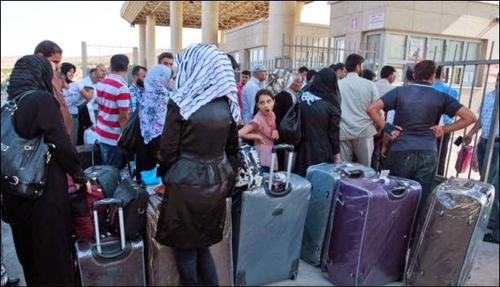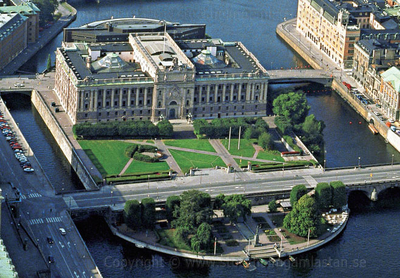Woe to anyone in Sweden who dissents from the orthodox view that welcoming large numbers of indigent peoples from such countries as Iraq, Syria, and Somalia is anything but a fine and noble idea. Even to argue against permitting about 1 percent of the existing population to emigrate annually from an alien civilization renders one politically, socially, and even legally beyond the pale. (I met a journalist threatened with arrest for mild dissent on this issue.) To state that there exists a Swedish culture worth preserving meets with puzzlement.
 The Swedish government has opened the door to Syrian refugees. |
And yet, the realities of immigration are apparent for all to see: welfare dependency, violent bigotry against Christians and Jews, and a wide range of social pathologies from unemployment to politically-motivated rape. Accordingly, ever-increasing numbers of Swedes find themselves – despite known hazards – opting out of the consensus and worrying about their country's cultural suicide.
The taboo on such attitudes means that political parties, with only one exception, staunchly support continued immigration. Only the Sweden Democrats (SD) offer an alternative: real efforts to integrate existing immigrants and a 90 percent decrease in future immigration. Despite an unsavory neo-fascist past (not something unique to it, by the way), SD has become increasingly respectable and has been rewarded with electoral success, doubling its parliamentary vote from 3 percent in 2006, to 6 percent in 2010, to 13 percent in 2014. All the Swedes with whom I spoke on a recent visit expect the SD vote to grow further, something recent polls confirm.
If a party or bloc of parties held a large majority in Sweden's unicameral parliament, SD would be virtually irrelevant. But the Riksdag's two blocs are almost equally balanced. Three left-wing parties control 159 of 349 seats, while the "right-wing" (quotation marks to denote that, from an American perspective, it's hardly conservative) Alliance for Sweden, consisting of four parties, has 141 seats. This means that SD, with 49 seats, holds the balance of power.
 Sweden's Parliament House (Riksdagshuset) in Stockholm. |
But SD is deemed anathema, so no party bargains with it to pass legislation, not even indirectly through the media. Both Left and "Right" seek to isolate and discredit it. Nevertheless, SD has played kingmaker on certain crucial legislation, particularly the annual budget. In keeping with its policy to drive from power every government that refuses to reduce immigration, it recently joined the Alliance for Sweden in opposing the leftist budget, forcing the government to call for elections in March 2015.
But then something remarkable occurred: the two major blocs compromised not only on the current budget, but also on future budgets and power-sharing all the way to 2022. The left and "right" alliances worked out trade-offs so that elections need not take place in March, allowing the Left to rule until 2018, with the "Right" possibly taking over from 2018 until 2022. Not only does this political cartel deprive SD of its pivotal role but, short of winning a majority of parliamentary seats in 2018, it has no meaningful legislative role for the next eight years, during which time the immigration issue is off the table.
 A graphic version of the two major parliamentary blocs' deal (the blue anemone hepatica flower is the Sweden Democrats' symbol). |
This is nothing short of astonishing: to stifle debate over the country's most contentious issue, 86 percent of the parliament joined forces to marginalize the 14 percent that disagrees. The two major blocs diluted their already tepid differences to exclude the insurgent, populist party. Mattias Karlsson, the acting SD leader accurately notes that with this deal, his party has become the only real opposition.
In the long term, however, things look good for SD, which will likely gain from this undemocratic sleight of hand. Swedes, long accustomed to democracy, do not appreciate a backroom arrangement that almost surely nullifies their votes in 2018. They don't like its bullying quality. Nor do they take well to removing a highly controversial issue from consideration. And when the time comes to "throw the bums out," as always it does, the Sweden Democrats will offer the only alternative to the tired, fractious coalition that will have been in power for eight long years – during which time immigration problems will alarm yet more voters.
In other words, this blatant act of suppression is spurring the very debate it is intended to quash. Before too long, the supreme issue of national suicide might actually be discussed.
Mr. Pipes (DanielPipes.org, @DanielPipes) is president of the Middle East Forum. © 2014 by Daniel Pipes. All rights reserved.
Dec. 30, 2014 update: Simon Johnson and Johan Sennero of Reuters find that the SD won't have to wait long to benefit from the "December Agreement":
A deal between Sweden's mainstream political parties aimed at neutralizing the far-right and avoiding a snap election could backfire by legitimizing the nationalist Sweden Democrats as the main opposition and focusing debate on immigration. ... "The Sweden Democrats have strong momentum among voters and I don't think this agreement is going to stop that," said Magnus Hagevi, political scientist at Linnaeus University. "If they can get voters to see them as the only opposition party, that could win them support."
Polls find one in three Swedes seeing the deal as undemocratic and SD's support to be up to 17 percent.
Feb. 2, 2015 update: I wrote above that "To state that there exists a Swedish culture worth preserving meets with puzzlement." Here is an example, from the leading Social Democrat politician Mona Sahlin: asked in 2002, "What is Swedish culture?" she memorably replied:
I've often had that question but I cannot figure out what Swedish culture is. I think that is what makes many Swedes so envious of immigrant groups. You have a culture, an identity, a history, something that binds you together. What do we have? We have Midsummer's Eve and such corny things.
Oct. 10, 2015 update: The Christian Democrats, one of the four "conservative" parties of the Alliance that signed on to the December Agreement, has now rejected it by a 151-103 vote at a party conference, prompting its allies to follow its lead and creating the premise for a collapse of the Socialist-led government and snap elections. As the Sweden Democrats are gaining support at the expense of the other parties, the others are reluctant to go to the voters and may still find some mechanism to avoid doing so. Comment: This development would seem to confirm the prediction (see the Dec. 30, 2014 update) that the agreement would not last long, and certainly not until 2022.
Oct. 17, 2022 update: Right on schedule eight years later, the Sweden Democrats got their revenge for the 2014 exclusion: Moderate Party leader Ulf Kristersson has been elected prime minister on the basis of the Sweden Democrats's support.
